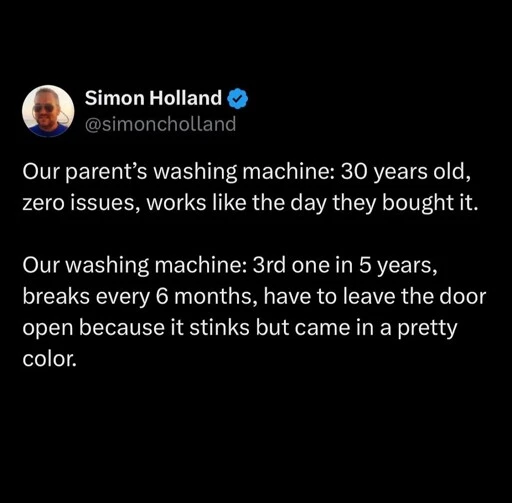Built to last
Built to last


Built to last


You're viewing a single thread.
Don't forget the wifi not connecting or staying connected, keeping it from getting updates for reasons mortals aren't supposed to know.
Why should a washing machine need updates to begin with?
So that manufacturers can patch up remote exploits, duh!
Always online model of laundry DRM. When the servers shut down then the washing machine stops working.
Also, washing machines tend to eat up one sock. Now there's going to be a micro transaction to get the sock back.
Why in God's name would you connect it to WiFi?
Most of this can be achieved in other ways (like a smart plug measuring the current draw and a simple monthly reminder), but non-techies want turnkey solutions.
I can't see any reason to have WiFi on your dryer, though.
All the things that you mentioned are already possible and have been since a decade or before.
- It can tell you it's done, so you notice the notification after a couple hours instead of finding musky clothes a day or two later
There's an estimate and a timer and the machine let's you know when its done. This is a 2014 model to say the age.
- It can tell you it's time to do the self-cleaning cycle
This is also something that is already automated and the machine does itself and can do manually if you ask.
- If you're doing something unusual, like washing reusable diapers which need extra rinse cycles, you can upload a custom program for that to the washer
You can add extra Rinse cycles for specific clothes and have custom programs too.
- Even more unusual, someone had stacked units and was too short to reach the buttons on the washer, so they liked to start it via the app instead of getting a stool
The controls being an inconvenience I can give you that. But, barring that its not stone age you would think it to be.
Fully automatic machines without WiFi work fine and don't need any software updates to begin with.
Love how you took the time for a point-for-point rebuttal while ignoring that I already acknowledged all of that:
Most of this can be achieved in other ways (like a smart plug measuring the current draw and a simple monthly reminder), but non-techies want turnkey solutions.
I read your smart-plug bit. But, even that's not necessary to achieve most of it since its built-in modern day washing machines.
I made that comment to highlight to others and for information purpose like yours was as a reply to "why would it connect to WiFi?" .
Most of this can be achieved in other ways (like a smart plug measuring the current draw
Idk about other people, but this is actually harder than you'd think. I've got zigbee and zwave hubs in my house for my home automation system, but there's really not anything that uses those technologies and has the screwy power plug my washer has. I grabbed some inducement sensors (I think that's what they're called), but I can't use them near my washer since they have to be hooked to the line to have a reference and my washer is too far away from my fuse box.
In the USA I use a Zooz Zen15 on the power plug for my heat pump dryer (120v). This works very well to notify my Alexa system that the dryer cycle is complete, and turns the dryer off. The Zooz is a zwave device connected to an Aeotec zwave hub.
Which country is this? I think both American and European (or at least Norwegian) washers use standard plugs (although American dryers do not), so I'm just curious which areas use something custom for that.
A regular plug should be able to supply a washer with power, but dryers are a different story in countries using 110V power.
I bought a new washing machine last year that has no WiFi, if you don't want to you don't have to buy shit like that
I remember a guy actually monitoring how much data his washing machine used and it was like 6 gigs a month. Is it mining bit coin???
And it has to be the horrible, congested and overused 2.4 GHz band.
They would need to double the costs to accommodate both 2.4GHz and 5Ghz bands if they choose the latter for backwards compatibility with electronics.
…which is why we shouldn’t be using WiFi for IoT devices when we have Zigbee and Z-Wave. I’ll never know why they’ll insist on using the more expensive and always changing WiFi standard.
This is 1st time hearing about ZigBee and Z-wave. How would they work with existing electronics?
The manufacturer would have had to have already installed a radio for either of the two. Another downside would be having to have a gateway device for either.
Philips hue uses Zigbee (the hub they give you is a Zigbee gateway). I’m also into the Aqara ecosystem which uses the two as well.